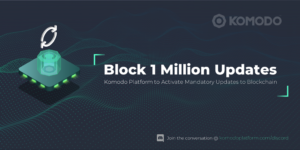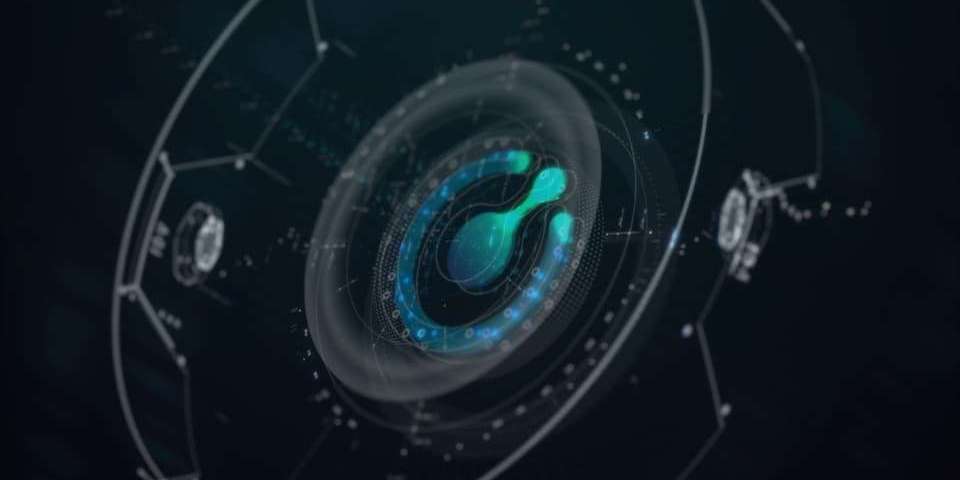In roughly one month, at block height 1 Million, Komodo will implement updates to the KMD blockchain's codebase.
This means that an update is mandatory for all notary nodes, miners, mining pools, exchanges, developers, and any other individuals using the KMD chain.
Everyone must make the update prior to the changes being activated at block 1 Million. The KMD chain will hit block 1 Million some time in the first week of September 2018.
The adjustments to the codebase create minor changes to KMD cryptocurrency mining and KMD user rewards. They also activate the first four UTXO-based smart contracts on Komodo Platform.

An End To Free-For-All Mining Periods
Under the present circumstances, there is what’s known as a “free-for-all” (FFA) mining period every 2,000 blocks. The FFA mining period lasts 64 blocks. It’s called a free-for-all because, during that period, notary nodes are not given “easy” blocks to mine.
Komodo has a team of 64 notary nodes that perform technical tasks critical to the security and interoperability of the ecosystem. For instance, the notary nodes notarize the KMD chain onto the Bitcoin ledger every ten minutes as part of Komodo’s Delayed Proof of Work security mechanism.
The notary nodes also use Merkle proofs to sync multiple chains with one another, thus creating a cluster of chains with seamless blockchain interoperability.
All notary nodes are currently allowed to mine one block on “easy” mode every 65 blocks. This is a reward granted to the notary node operators for the crucial technical work they perform. It is also an incentive for notary nodes to continue fulfilling this essential role.
As noted above, a 64 block free-for-all mining period occurs every 2,000 blocks. This allows both notary nodes and ordinary miners compete to mine blocks at the same difficulty setting. However, at block 1 Million, the FFA mining period will be removed.
Instead, Komodo will adjust the code to recalibrate the non-notary mining share to roughly 25% of all blocks. Mining rewards will remain relatively constant at all times, rather than going through periods of notary-node-rewards followed by periods of free-for-all mining.
This change is being made to encourage miners to consistently mine the KMD chain, rather than mining only during free-for-all periods. As a result, the hashrate of the KMD network will become more stable and more secure.
KMD User Rewards Must Be Claimed Monthly
Users who own at least 10 KMD (and the corresponding private keys) currently receive 5% user rewards for holding those coins and moving them at least once per year. If one year passes without the coins being moved, the rewards stop accumulating. Once the KMD is moved, the owner begins receiving rewards again.
Soon, the rewards system will change slightly. Starting at block 1 Million, users will need to move their funds once per month to earn full rewards. In Agama wallet, users can send funds back to themselves, and therefore collect their rewards, with literally one click of a button.
This new reward system is being implemented to encourage users to be active and use KMD more often. In return for moving their KMD once a month, users will receive a maximum annual reward of 5%.
The user rewards are built into the Komodo codebase. More specifically, every UTXO is created with the ability to increase in value by 5% per year. The increase begins one hour after each new UTXO is generated. If left alone for one month, the UTXO will have a 5/12% increase.
Imagine that you deposit 100 KMD into Agama wallet and wait 30 days. At that point, you could collect your rewards and receive 100.4167 KMD. Then, the rewards would begin accumulating on that new, slightly larger balance. After another 30 days, the reward could be collected for a new total of 100.835 KMD. And so on, until at the end of the 12th month, when the final sum would be approximately 105 KMD.
Your final balance may actually be slightly more, as KMD rewards are technically 5.1% minus the twelve transaction fees required to claim the reward each month.
Komodo is pleased to offer these rewards to active users who hold their funds in an eligible wallet. Remember to log into your wallet and move your KMD once per month in order to receive the full reward.
Unfortunately, Komodo cannot guarantee that all third-party wallets will allow users to claim their rewards. In particular, users who hold their KMD on a Ledger wallet are currently not eligible to claim the 5% rewards.
While Ledger hardware wallets are an extremely safe way to store cryptocurrency, there is a technical limitation that prevents users from collecting rewards if their KMD is stored on a Ledger wallet.
We recommend using Agama wallet instead, which allows users to easily claim rewards with just one click.
Komodo's UTXO-Based Smart Contracts
The updates at Block 1 Million will bring the implementation of the first four UTXO-based smart contracts to Komodo Platform: Assets, Faucet, Rewards, and Dice contracts.
The Assets contract allows any blockchain on the Komodo ecosystem to create tokens on-chain. One native coin from any assetchain can create as many as 100 Million tokens, which can then serve to represent assets.
The Faucet smart contract is exactly what it sounds like: a faucet that allows users to draw a fraction of a token (given that they meet a set of conditions).
The Rewards contract is a way to give users a reward for locking their funds into a Custom Consensus module address for a specific length of time. It's similar to the incentives of a Masternode coin.
Finally, the Dice smart contract is simply a dice game. It's completely blockchain-enforced and doesn’t require users to download any software or sign up for services. The results of each round of play are known within a few seconds.
Update Before Block 1 Million
For notary nodes, miners, mining pools, exchanges, and developers, this update is mandatory. Please make sure to activate the new code well in advance of block 1 Million to avoid any issues. Instructions on how to update can be found here.
All users of Agama wallet must update to the latest version. This is true for both Native Mode and Lite Mode (SPV Mode) users. The latest version of Agama wallet can be downloaded here.
If you have any questions or need some help with this update, you may contact support on Komodo’s Discord community or email support directly at [email protected].
Thanks for your understanding and cooperation.
